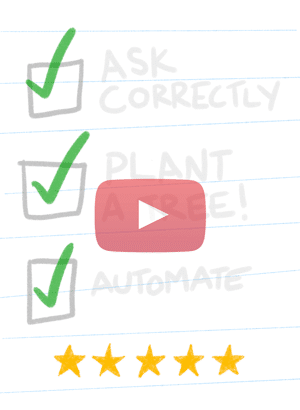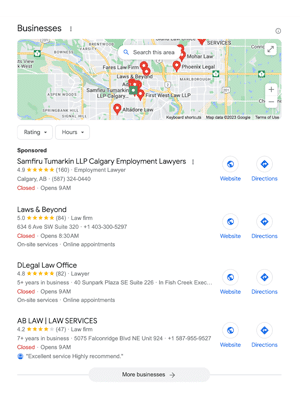ASKING SOMEONE “Can you leave me an online review?” is like asking someone “Do these jeans make my butt look big?” It’s a loaded question. If you’re wondering how to ask for reviews, it’s simple. Whether you’re after a Google, Yelp or Facebook review: Don’t ask for a review.
Everyone else is saying the opposite. So yes, it seems counter-intuitive. But close your eyes and imagine unicorns. Good. Now imagine there was a way of getting hundreds of online reviews without asking. Now breathe out and discover one of those things is real.
We’re going to break down why asking “for reviews” sucks and also reveal a superior approach to getting reviews inspired by Harvard Business School1 and disruptor extraordinaire Elon Musk.
- Introduction
- You’re in a five-star arms race
- How to ask for reviews: Don’t
- The power of meaningful connections
- Feedback is better: Says us (and Elon Musk)
- Now turn your feedback into reviews!
Prefer to watch the video version of this post?
Introduction
Here’s what we’ve learned: your online reviews matter. They matter big time. Your online reviews influence whether someone will connect with you first or give your arch rival, Johnny Underpants, a call because he’s got 255 more reviews than you on Google, Yelp, and Facebook.
If you care about A) winning new business from the internet and B) not bleeding business to your competitors, then you need to be paying attention to what’s happening with your online reputation and how that compares to the reputation of your direct competition. Because you baby, are now in a five-star arms race.
You’re in a five-star arms race
Yup. Whether you like it or not, you’re in a five-star arms race and you need to know what the score is right now.
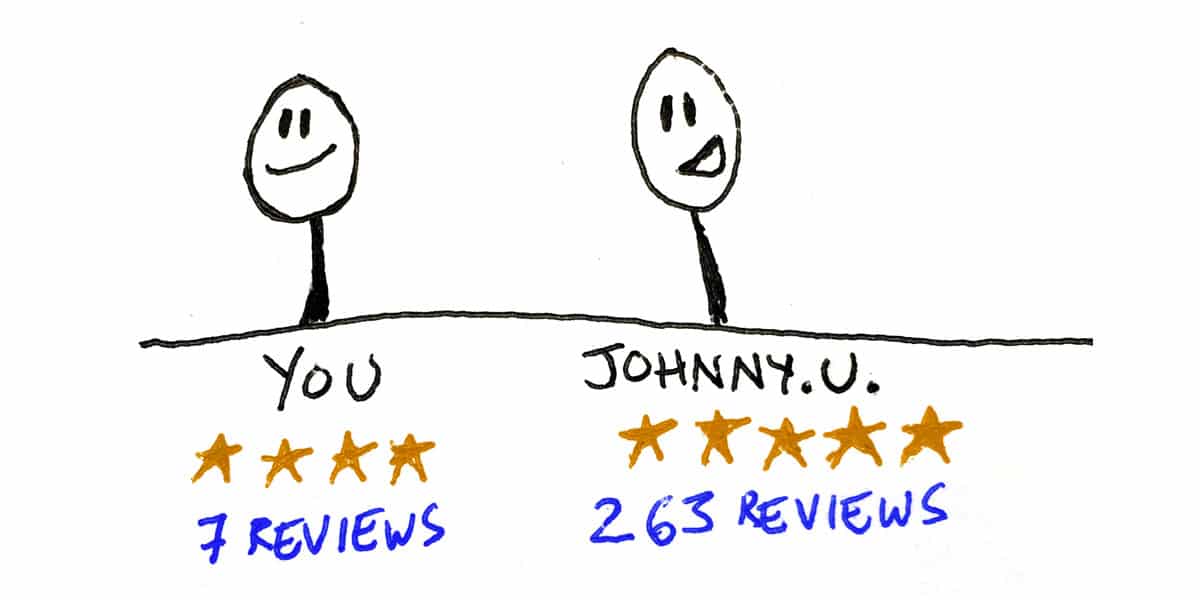
Think about it from a consumers perspective. The most important equation consumers try to resolve before transacting is: “Can I trust X?”
What is X you ask?
X is everything from a hotel in Cancun, to an emergency plumber. X is a local florist, a day spa, an injury lawyer and if you’re in business X is you baby.
Trust is the first factor determining whether money changes owners. At the local business level, your reputation IS your brand. and online reviews provide an at-a-glance barometer of how trustworthy the marketplace says you are.
Let’s be clear; you’re not going to increase revenues by telling the marketplace how awesome you are, it’s what the marketplace is saying about you that matters most. People have less and less time to vet anything or anyone so online reviews let us expedite our buying choices.
You want people to quickly decide to spend money with you, right? Right. So if you want to win new business and ethically steal market share then
- You need online reviews (as many as possible)
- You need a high rating (usually out of five stars)
- Most importantly, you need a HIGHER rating and MORE reviews than your competition
If you can accomplish this then its game, set and match to you. And you’ll hear that little cha-ching sound over and over again.
How to ask for reviews: Don’t
If you Google for “how to ask for reviews” you’ll get the usual suspects showing up. Old-school advice encouraging you to outright ask for reviews. At first it sounds like a no-brainer. It sounds so easy but the advice is the same lame stuff just worded slightly differently such as “If you want reviews then all you gotta say is…”
- “Hey could you leave us a Google review?”
- “Would you leave us a Yelp review?”
- “Can you give us a review on Facebook?”
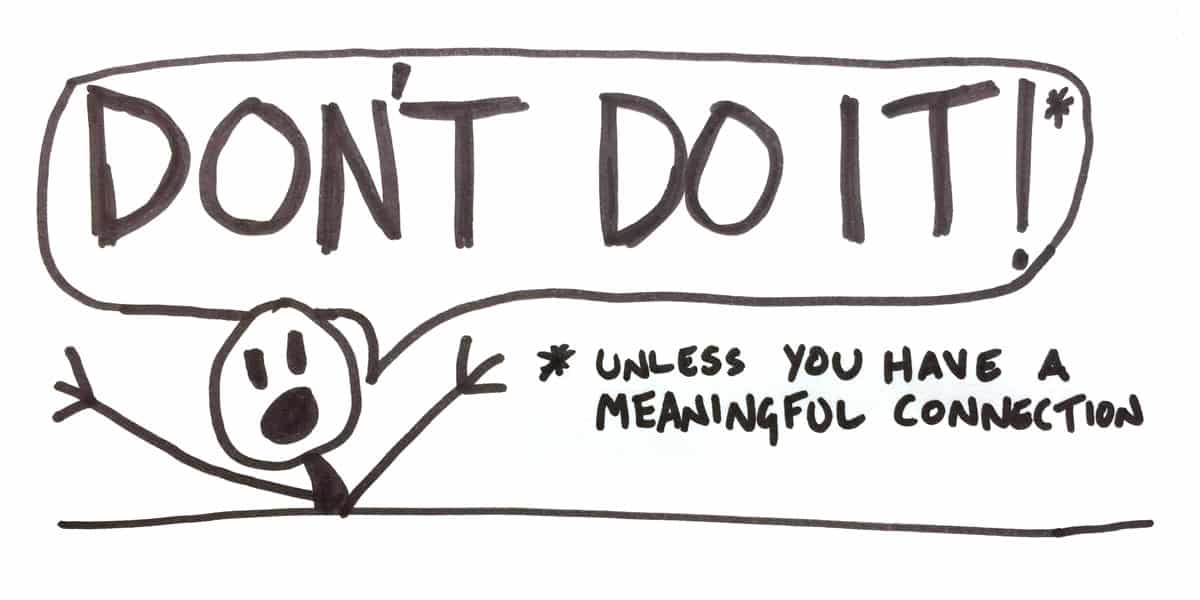
For most business types, this tired approach to asking for online reviews is about as ineffective and awkward as Eugene asking his date to the prom. Our Members here at Starloop use our special script that converts like crazy. But let’s look at why we moved away from this old method of asking for reviews.
“Can you leave us an online review?”
Whether you’re seeking to build Google, Yelp, Facebook reviews, think what it’s like being your customer and being asked: “Hey Jane can you leave us a Yelp review?” As soon as you finished uttering that lame string of words, she knows and you know you’re fishing for a five-star review and it’s a-w-w-w-kward. Jane wasn’t expecting her visit today to involve being asked a loaded question.
The power of meaningful connections
Nope, this isn’t Tony Robbins’ next book. There are exceptions to every rule and the most critical factor in whether you should ask outright for an online review is whether you have a “meaningful connection”.
Here are some professions where asking outright “for a review” is A-OK.
- Real estate agent
- Lawyers
- Midwives
- Custom home builder
- Architect
You’ll still need to mind numbingly chase people up to get the review (saving time with automation is for another post) but these types of professions have a meaningful connection by the time the transaction is complete. They’re good to go. Conversely, here’s a whole bunch of everyday transactions where there is no such meaningful connection (not even close):
- Buying coffee or breakfast or lunch or dinner
- Buying groceries
- Hiring any kind of contractor to fix your stuff (electrician, plumber etc.)
- Doing any kind of fitness class
- Any profession that doesn’t spend significant time with the customers
The list is a million deep for these kinds of shallow interactions. Unlike the professions above, these relatively quick transactions don’t have any real depth of meaning or connection between you and the service providers.

And with little to no meaningful connection (or accurate measure of how customers feel) asking for a review is – again – awkward at best and downright inappropriate at worst. In fact, asking for a review in these situations often comes across sleazy and it’s not recommended for most local businesses looking to build a genuine, money-making online reputation.
Feedback is better says us (and Elon Musk)
OK so professions who have a meaningful connection get a pass; they can ask for online reviews. The rest of us need to be engaging our customers not “for reviews” but “for feedback.”
Yes, you’re not asking for reviews. You’re asking for feedback.
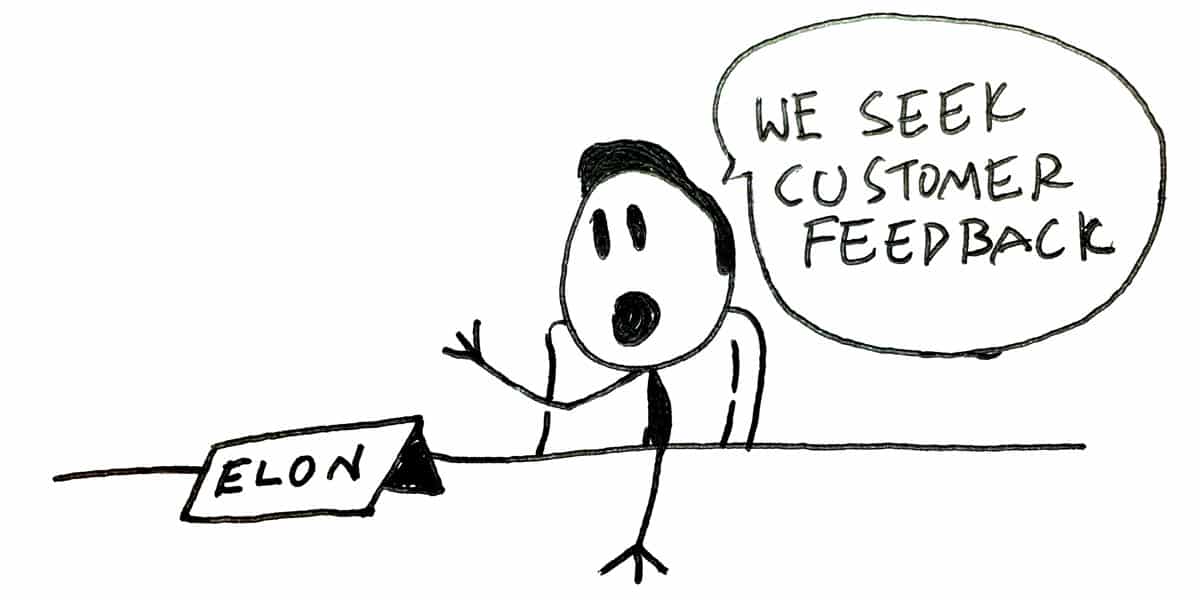
Go with me here … when you ask someone for feedback, you’re engaging them from a position that says “We’d love to know what you think.” It starts the engagement from a neutral position that isn’t a cheese-ball wink-wink-nudge-nudge for a five-star review.
Are you smarter than Elon Musk? Nein!
Elon Musk considers “actively seeking customer feedback” as one of the most valuable keys to his success. Getting customer feedback isn’t something he might get around to one day, it’s a priority, all the freakin’ time. Without customer feedback, he’s shooting in the dark and entrepreneurs like Elon don’t take low percentage shots in the dark if they don’t have to.
Elon is busy disrupting the entire human race. And if he says that engaging for feedback is a core part of his strategy then we’re getting on that train too. We’re doing it because Elon does it. Because it’s the smart thing to do and unlike other things he does (such as building electric cars and reusable rockets), this is a high-value task we can easily execute. We’ll engage for feedback because:
- Elon does it
- It’s smart
- It’s far less awkward than asking for a review
- It results in valuable insights from those who are unhappy
- Gives us the opportunity to improve AND/OR get an online review
- Let’s us provide a genuinely better service to our clients
By now, I hope you’ll agree. That online reviews (the voice of the marketplace) is the most powerful way to give yourself a genuine competitive advantage.
Now turn your feedback into reviews!
All making sense? Now you’re asking for feedback rather than reviews. The next step is to be an alchemist and transmute your online feedback into valuable online reviews. There are a number of ways to do this, some methods are shady, some are ethical. Ideally, you want to:
- Automatically capture your customer feedback and
- Focus that feedback into genuine five-star reviews (on Google, Facebook, Yelp or wherever it’s valuable to you)
- Do both of these things automatically and ethically
All of the above can take a lot of time so in order to accomplish all of the above, explore a getting a solution like Starloop in place. This will help you save time and accomplish your ultimate aim of being the highest rated, most reviewed competitor in your marketplace.
This is how we get online reviews the Starloop way.
1. “Reviews, Reputation, and Revenue: The Case of Yelp.com” – Harvard Business School Working Paper, No. 12-016, September 2011. (Revised March 2016. Revise and resubmit at the American Economic Journal – Applied Economics.)
